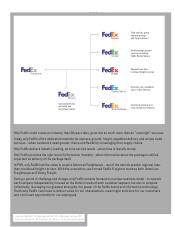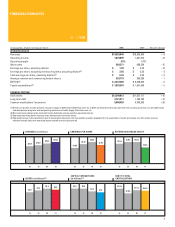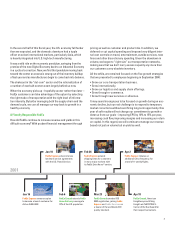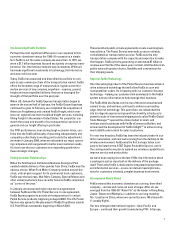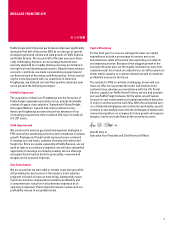Federal Express 2001 Annual Report Download - page 11
Download and view the complete annual report
Please find page 11 of the 2001 Federal Express annual report below. You can navigate through the pages in the report by either clicking on the pages listed below, or by using the keyword search tool below to find specific information within the annual report.
FedEx Corporation
9
cash flow, continue strict controls over discretionary spending
and implement other measures to reduce commitments for lift
capacity in excess of our needs (see “FedEx Express – Outlook”).
Cash incentive programs for 2002 have been substantially
reduced for most employees, including all members of senior
management, and these programs will begin to pay out only if we
exceed our 2002 financial targets. However, anticipated reduc-
tions in 2002 incentive costs are expected to be offset by higher
pension expense resulting from changes in discount rates and
unrealized market declines in pension assets.
Despite the near-term economic outlook, we continue to believe
that we are well positioned for long-term growth. In January 2001,
FedEx Express entered into a business alliance with the U.S.
Postal Service, which is expected to generate revenue of approx-
imately $7 billion over seven years and is consistent with our
goals of improving margins, cash flows and returns. The alliance
consists of two service agreements. In the first nonexclusive
agreement, FedEx Express will install drop boxes at U.S. Post
Offices, and in the second agreement, FedEx Express will provide
airport-to-airport transportation of Priority, Express and First
Class Mail. On June 18, 2001, we officially launched the national
rollout of FedEx Drop Boxes at post offices throughout the coun-
try, implementing the first of these service agreements. FedEx
Express is scheduled to begin the agreement for air transporta-
tion in late August 2001. In 2002, we will also continue the busi-
ness alliance in Europe with La Poste, established in 2001.
The acquisition of American Freightways substantially enhanced
our overall transportation portfolio by enabling us to offer a
regional LTL service virtually everywhere in the United States.
During 2002, we will focus on increasing volumes and yields in
our core high-quality next- and second-day regional freight serv-
ices. In addition, we will continue to expand our FedEx Home
Delivery network and will continue to pursue new service and
business opportunities, such as those mentioned above, in sup-
port of our long-term growth goals.
Actual results for 2002 will depend upon a number of factors,
including the extent and duration of the current economic down-
turn, our ability to match capacity with volume levels and our abil-
ity to effectively implement our new service and growth initiatives.
See “Forward-Looking Statements” for a more complete descrip-
tion of potential risks and uncertainties that could affect our
future performance.
Recent Accounting Pronouncements
We adopted Statement of Financial Accounting Standards
No. (“SFAS”) 133, “Accounting for Derivative Instruments and
Hedging Activities” (as amended by SFAS 137 and SFAS 138) at
the beginning of 2002. The adoption of this Statement will not
have a material effect on our financial position or results of oper-
ations for 2002. Because of our previously mentioned fourth quar-
ter 2001 actions regarding jet fuel hedging contracts, none of the
jet fuel hedging contracts held at May 31, 2001 qualify for hedge
accounting treatment. However, our usual jet fuel hedging pro-
gram does qualify for cash flow hedge accounting treatment
under which changes in the fair market value of these contracts
are recorded to Accumulated Other Comprehensive Income.
During July 2001, SFAS 142, “Goodwill and Other Intangible
Assets” was issued by the Financial Accounting Standards
Board. Under SFAS 142, goodwill amortization ceases when the
new standard is adopted. The new rules also require an initial
goodwill impairment assessment in the year of adoption and
annual impairment tests thereafter. We are permitted under the
rules to adopt this Statement effective June 1, 2001 or defer
adoption until June 1, 2002. Once adopted, goodwill amortization
of approximately $36 million on an annualized basis will cease.
We have not yet determined if any impairment charges will result
from the adoption of this Statement. At this time, we anticipate
the adoption of these rules, effective as of June 1, 2001.
REPORTABLE SEGMENTS
The formation of FedEx Services, effective June 1, 2000, changed
the way certain costs are captured and allocated between our
operating segments. For example, salaries, wages and benefits,
depreciation and other costs for the sales, marketing and infor-
mation technology departments previously incurred at FedEx
Express and FedEx Ground are now allocated to these operating
segments and are included in the line item “Intercompany
charges” on the accompanying financial summaries of our
reportable segments. Consequently, certain segment expense
data presented is not comparable to prior periods. We believe the
total amounts allocated to the business segments reasonably
reflect the cost of providing such services.


